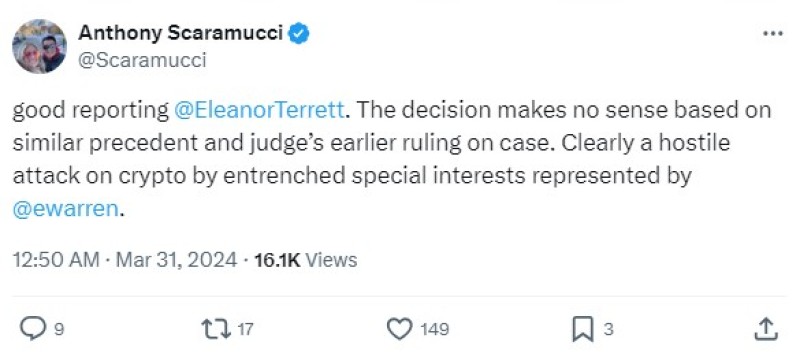Custodia Bank faces a blow as Judge Skavdahl denies access to Federal Reserve's master accounts, prompting investor Anthony Scaramucci to condemn the decision as a "hostile attack" on the crypto industry.
Crypto Industry Under Fire
In a scathing critique of a recent court ruling, Anthony Scaramucci, a notable figure in the investment realm, lambasted Judge Scott Skavdahl's decision, denouncing it as a targeted assault on the cryptocurrency sector. Taking to the X social media platform, Scaramucci expressed incredulity, asserting that the ruling appeared devoid of logical coherence and instead seemed intent on impeding industry progress.

Wyoming-based Custodia Bank encountered a significant setback this week when Judge Skavdahl of the District of Wyoming quashed its motion for judgment. The crux of the matter revolves around the Federal Reserve's denial of Custodia Bank's plea for access to its master accounts, a decision upheld by the presiding judge.
This ruling has compelled Custodia Bank to contemplate the prospect of lodging an appeal as it grapples with the ramifications of being denied entry to the Fed's inner financial sanctum.
Legal Dispute Unfolds
The legal saga traces back to 2022 when Custodia Bank initiated legal action following the Federal Reserve's refusal to grant it access to master accounts. The crux of Custodia Bank's argument rests on the contention that lack of access to these accounts places it at a distinct disadvantage vis-a-vis its competitors.
However, Judge Skavdahl found Custodia Bank's argument unconvincing, effectively dismissing their motion for judgment.
Conflicting Perspectives
Adding a layer of complexity to the legal imbroglio, Fox Business reporter Eleanor Terrett highlighted the contradictory nature of the court's opinions. One opinion suggests limitations on the Federal Reserve's discretion, implying a regulatory framework that constrains its authority.

Conversely, another opinion indicates an unfettered exercise of power by the Federal Reserve, leaving little room for external oversight. This stark disparity underscores the nuanced intricacies inherent in legal interpretation within the financial domain.
The ramifications of Judge Skavdahl's ruling extend beyond Custodia Bank, reverberating throughout the cryptocurrency sector. With access to the Federal Reserve's master accounts remaining elusive for some entities, reliance on intermediaries becomes inevitable, potentially hampering operational efficiency and market competitiveness.
The outcome of Custodia Bank's legal battle thus assumes significance beyond its immediate purview, serving as a litmus test for the regulatory landscape's stance on crypto integration within traditional financial frameworks.
Conclusion
As Custodia Bank weighs its options in the aftermath of Judge Skavdahl's ruling, the broader cryptocurrency community remains vigilant, cognizant of the implications for industry growth and regulatory acceptance. Anthony Scaramucci's condemnation underscores the stakes at play, casting a spotlight on the intersection of legal precedent, regulatory oversight, and technological innovation within the evolving landscape of finance.
 Peter Smith
Peter Smith

 Peter Smith
Peter Smith


